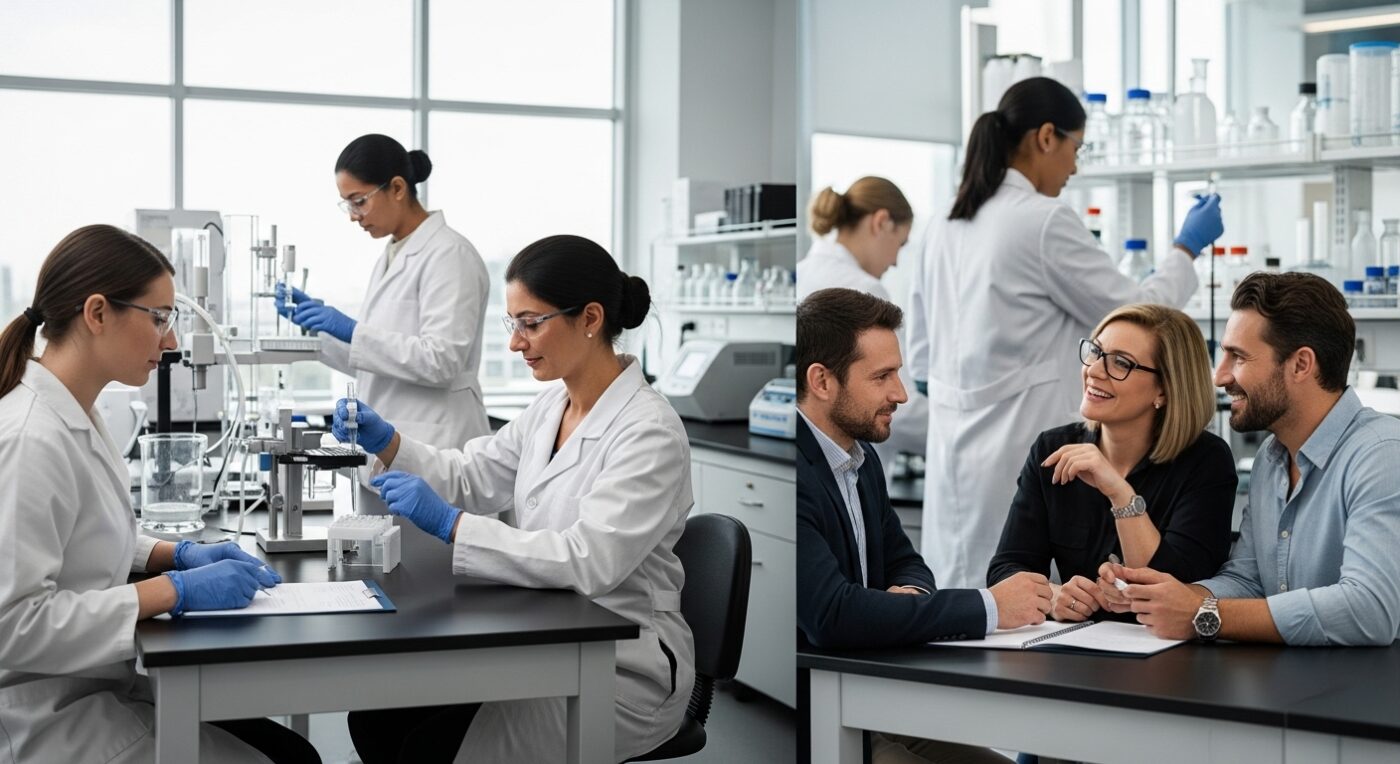Blog
7 Key Benefits of Third-Party Testing You Should Know
Third-party testing sounds like something only big companies worry about. Turns out, nearly 70 percent of healthcare decisions rely on lab results from unbiased sources. Most folks assume a product on the shelf means it is already safe and verified. That assumption can put your health on the line if you do not know who is really doing the testing.
Table of Contents
- Ensures Product Safety And Quality
- Provides Accurate Lab Results
- Builds Consumer Trust And Confidence
- Supports Regulation Compliance
- Enhances Brand Credibility
- Promotes Transparency In The Industry
- Protects Against Contamination And Fraud
Quick Summary
| Takeaway | Explanation |
|---|---|
| Third-party testing ensures product safety. | Independent labs validate that products meet safety standards and deliver consistent performance for consumer health. |
| Accurate lab results enhance consumer trust. | Independent assessments provide reliable, unbiased data that consumers and professionals can trust, improving product quality assurance. |
| Independent confirmation protects against fraud. | Advanced testing detects contamination and verifies authenticity, safeguarding consumers from potential risks associated with products. |
| Supports compliance with regulations. | Third-party tests help manufacturers meet complex legal requirements, preventing costly legal issues and ensuring proper documentation. |
| Promotes transparency in the industry. | Rigorous independent assessments create clear narratives about product integrity, fostering trust among consumers and businesses alike. |
1: Ensures Product Safety and Quality
Third-party testing represents a critical safeguard in ensuring product safety and quality across multiple industries, particularly in sectors like cannabis consumption where consumer health is paramount. By engaging independent laboratories to conduct rigorous scientific assessments, companies can validate their products meet stringent safety standards and deliver consistent performance.
The process of third-party testing goes far beyond simple quality checks. These specialized laboratories perform comprehensive evaluations that examine multiple dimensions of product integrity. Explore our guide on lab verification to understand the depth of these scientific assessments.
Key aspects of third-party testing that contribute to product safety include:
-
Chemical Composition Analysis: Identifying precise cannabinoid profiles and potential contaminants
-
Potency Verification: Confirming accurate concentration levels of active ingredients
-
Contaminant Screening: Detecting harmful substances like pesticides, heavy metals, and microbial agents
According to NSF International, third-party certification involves an independent organization reviewing a product’s manufacturing process to confirm adherence to specific safety, quality, or performance standards. This comprehensive evaluation typically includes formulation reviews, testing, and facility inspections.
For consumers, third-party testing provides transparency and peace of mind. Independent verification means you can trust the product’s claims, knowing that an unbiased scientific assessment has validated its safety and quality. By prioritizing third-party testing, manufacturers demonstrate their commitment to consumer protection and product excellence.
The rigorous nature of these tests ensures that only products meeting the highest standards reach consumers, effectively minimizing potential health risks and establishing trust in the marketplace.
2: Provides Accurate Lab Results
Third-party laboratory testing provides an unparalleled mechanism for generating precise, scientifically validated results that consumers and industry professionals can trust. Unlike internal testing, which might be influenced by potential bias, independent laboratories bring an objective lens to product analysis, ensuring maximum transparency and reliability.
Learn more about our advanced verification processes and understand how comprehensive testing supports consumer confidence.
The significance of accurate lab results extends far beyond simple data collection. These rigorous assessments encompass multiple critical evaluation parameters:
-
Comprehensive Chemical Profiling: Detailed molecular analysis of product composition
-
Quantitative Potency Measurement: Precise determination of active ingredient concentrations
-
Contamination Detection: Identifying potential biological or chemical impurities
According to FDA and CMS research, approximately 70% of healthcare decisions rely on laboratory test results, highlighting the paramount importance of accuracy and reliability.
Independent laboratories utilize advanced scientific equipment and follow standardized protocols to generate results that meet strict scientific and regulatory standards. These professionals employ sophisticated analytical techniques such as gas chromatography, mass spectrometry, and high-performance liquid chromatography to ensure exceptional precision.
For consumers and industry stakeholders, accurate lab results provide more than just data. They offer peace of mind, confirming product quality, safety, and compliance with established regulatory frameworks. By presenting transparent, independently verified information, third-party testing creates a foundation of trust between manufacturers and consumers, ultimately elevating industry standards and protecting public health.
3: Builds Consumer Trust and Confidence
Third-party testing serves as a powerful mechanism for establishing and reinforcing consumer trust in an increasingly complex marketplace. By providing transparent, scientifically validated information, these independent assessments create a robust framework of credibility that goes far beyond traditional marketing claims.
Discover our approach to supplier safety compliance and understand how rigorous verification processes protect consumer interests.
Consumers today are more informed and discerning, seeking concrete evidence of product quality and safety. Third-party testing directly addresses these expectations by offering:
-
Unbiased Verification: Independent confirmation of product claims
-
Transparent Reporting: Comprehensive documentation of scientific assessments
-
Regulatory Compliance: Confirmation of adherence to industry standards
According to research published in Frontiers in Psychology, shared values between platforms and consumers significantly enhance trust, with mutual commitment being particularly influential in purchasing decisions.
The psychological impact of third-party testing cannot be overstated. Consumers feel more confident when they know an independent, objective entity has thoroughly examined a product. This validation transforms abstract claims into tangible reassurance, bridging the gap between marketing language and scientific reality.
Moreover, third-party testing demonstrates a company’s commitment to transparency and consumer protection. By voluntarily subjecting products to rigorous independent scrutiny, businesses signal their dedication to quality, safety, and ethical practices. This proactive approach not only builds trust but also differentiates brands in competitive markets where consumers increasingly prioritize authenticity and accountability.
4: Supports Regulation Compliance
Third-party testing plays a critical role in ensuring products meet stringent regulatory requirements across various industries. By providing an independent and objective assessment, these tests help manufacturers navigate complex legal landscapes and demonstrate unwavering commitment to compliance.
Read our comprehensive guide on packaging safety standards to understand how regulatory compliance protects consumers and businesses.
The regulatory compliance process involves multiple sophisticated elements that go beyond simple checkbox approaches:
-
Systematic Documentation: Comprehensive record-keeping of testing procedures
-
Independent Verification: Objective assessment of product standards
-
Continuous Monitoring: Regular evaluations to maintain ongoing compliance
According to the Administrative Conference of the United States, federal agencies increasingly utilize third-party programs to assess regulatory compliance across diverse sectors, leveraging private resources to enhance regulatory effectiveness and reduce governmental assessment costs.
For manufacturers, third-party testing represents more than a legal requirement. It is a strategic approach to risk management. By proactively engaging independent laboratories, companies can identify potential compliance issues before they escalate, preventing costly recalls, legal challenges, and reputational damage.
Moreover, third-party testing provides a transparent mechanism for demonstrating due diligence. When regulatory agencies or potential legal challenges arise, having comprehensive, independently verified documentation can be an invaluable defense. This approach transforms compliance from a bureaucratic obligation into a proactive strategy for protecting both consumer interests and business integrity.
5: Enhances Brand Credibility
Third-party testing represents a powerful strategy for transforming brand perception and establishing industry leadership. By voluntarily submitting products to rigorous, independent scientific scrutiny, companies demonstrate an unwavering commitment to transparency and quality that transcends traditional marketing approaches.
Explore our comprehensive supplier safety compliance approach to understand how verification builds brand reputation.
The process of enhancing brand credibility through third-party testing involves several strategic dimensions:
-
Transparent Validation: Independent confirmation of product claims
-
Quality Demonstration: Objective evidence of superior standards
-
Consumer Trust Building: Proactive commitment to safety and excellence
According to research published in the National Center for Biotechnology Information, third-party certification significantly improves consumer trust by reducing perceived risk through objective verification.
In an increasingly skeptical marketplace, brands that embrace third-party testing distinguish themselves as industry pioneers. These organizations signal that they are not content with meeting minimal standards but are committed to exceeding expectations. The independent validation becomes a powerful differentiator, communicating a level of integrity that resonates with discerning consumers.
Moreover, third-party testing transforms brand communication from self-promotional rhetoric to scientifically substantiated fact. When consumers see comprehensive, objective documentation, they perceive the brand as confident, responsible, and genuinely invested in delivering exceptional quality. This approach converts potential skepticism into trust, creating a compelling narrative of brand reliability that extends far beyond traditional marketing strategies.
6: Promotes Transparency in the Industry
Third-party testing emerges as a powerful catalyst for driving unprecedented transparency across complex industry landscapes. By introducing independent, scientific validation, these rigorous assessments transform opaque processes into clear, verifiable narratives that benefit consumers, manufacturers, and regulatory bodies alike.
Learn more about our comprehensive lab verification processes and understand how transparency becomes a competitive advantage.
Transparency through third-party testing manifests through several critical mechanisms:
-
Open Reporting: Comprehensive documentation of scientific findings
-
Unbiased Assessment: Objective evaluation without internal corporate influences
-
Public Disclosure: Accessible results that empower consumer understanding
According to the National Academies Press, third-party testing plays a vital role in providing independent verification of product claims, thereby building public and regulatory trust through systematic, transparent processes.
The paradigm shift towards transparency goes beyond mere data sharing. Manufacturers who embrace third-party testing demonstrate a profound commitment to ethical practices, signaling to consumers and regulators that they have nothing to hide. This approach fundamentally challenges traditional industry opacity, where product claims often went unchallenged and unverified.
Moreover, transparency becomes a competitive differentiator. Companies that voluntarily subject themselves to rigorous, independent scrutiny position themselves as industry leaders. They communicate a powerful message: confidence in their products is so strong that they welcome comprehensive, objective evaluation. This bold stance not only builds consumer trust but also challenges competitors to match their level of openness and commitment to quality.
7: Protects Against Contamination and Fraud
Third-party testing represents a critical defense mechanism against product contamination and fraudulent practices, serving as an independent sentinel that safeguards consumer interests and industry integrity. By implementing sophisticated scientific protocols, these comprehensive assessments create multiple layers of protection against potential risks.
Explore our advanced supplier safety compliance strategies to understand comprehensive fraud prevention approaches.
The process of protecting against contamination and fraud involves multiple strategic interventions:
-
Molecular Level Screening: Detecting microscopic contaminants
-
Chemical Composition Analysis: Identifying potential adulterants
-
Authenticity Verification: Confirming product origin and integrity
According to research published in the International Journal of Environmental Research and Public Health, third-party laboratory testing plays a pivotal role in verifying product integrity and preventing fraud across various industries.
Beyond immediate safety concerns, third-party testing functions as a sophisticated fraud detection system. Laboratories employ advanced analytical techniques like spectrometry, chromatography, and genetic testing to uncover even the most subtle signs of contamination or misrepresentation. These methods go far beyond surface-level inspections, diving deep into the molecular structure of products.
For consumers and businesses, this approach transforms product verification from a reactive process to a proactive shield. By systematically identifying potential risks before they reach the market, third-party testing creates a robust barrier against fraudulent practices.
Below is a comprehensive table summarizing the 7 key benefits and outcomes of third-party testing as described in the article.
| Benefit | Description |
|---|---|
| Ensures Product Safety and Quality | Independent labs validate products meet strict safety standards, confirm potency, and screen for contaminants, reducing risk. |
| Provides Accurate Lab Results | Unbiased scientific evaluation delivers reliable, precise data that supports quality assurance and informed decision making. |
| Builds Consumer Trust and Confidence | Transparent third-party results enhance credibility, making consumers feel confident in product claims and brand reliability. |
| Supports Regulation Compliance | Helps manufacturers document and meet legal requirements, reducing the likelihood of costly recalls or legal challenges. |
| Enhances Brand Credibility | Voluntarily adopting third-party testing demonstrates commitment to quality, differentiating brands and building industry trust. |
| Promotes Transparency in the Industry | Open reporting and independent verification foster transparency, setting a higher ethical standard for the entire market. |
| Protects Against Contamination and Fraud | Advanced screening methods proactively detect contaminants, adulterants, and fraudulent products, safeguarding consumers and brands. |
Ready to Experience Truly Verified Quality?
After learning about the importance of third-party testing in ensuring safety, transparency, and authenticity, you may still feel uncertain about the real-world reliability of disposable cannabis vape products. The concern about product contamination, misleading potency claims, or even counterfeit devices is real and can threaten your safety and enjoyment. This is why lab verification and visible proof of purity are crucial for peace of mind.

At Ace Ultra Premium Co., every vaporizer is backed by third-party lab certifications and stringent verification procedures you can access before you buy. Our commitment to transparency allows you to authenticate your purchase and confidently enjoy advanced flavors, precise potency, and genuine safety. Do not settle for uncertainty. Visit our site now and see for yourself how uncompromising quality and honest results protect your experience from start to finish.
Frequently Asked Questions
What is third-party testing?
Third-party testing refers to the evaluation of products by independent laboratories to verify safety, quality, and compliance with industry standards. This process ensures objective assessments free from manufacturer bias.
Why is third-party testing important for product safety?
Third-party testing is crucial for product safety as it provides comprehensive evaluations, including chemical composition analysis, potency verification, and contaminant screening. This helps ensure that products meet stringent safety standards, protecting consumer health.
How does third-party testing build consumer trust?
Third-party testing builds consumer trust by offering unbiased verification of product claims. When consumers see independent assessments, they feel more confident that the products are safe and meet quality standards, enhancing overall brand credibility.
What benefits does third-party testing provide to manufacturers?
For manufacturers, third-party testing helps ensure regulatory compliance, safeguards against contamination and fraud, and enhances brand credibility. It also acts as a proactive risk management strategy, preventing costly recalls and legal issues.
Recommended
- 7 Key Reasons for the Importance of Lab Verification – ACE ULTRA PREMIUM
- Understanding Why Batch Testing is Essential for Cannabis – ACE ULTRA PREMIUM
- Understanding the Guide to Packaging Verification – ACE ULTRA PREMIUM
- Understanding the Role of Verified Ingredients in Cannabis – ACE ULTRA PREMIUM

